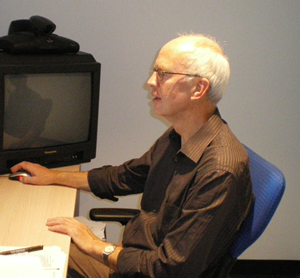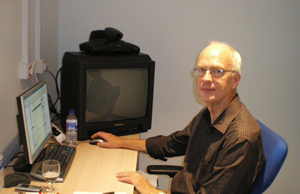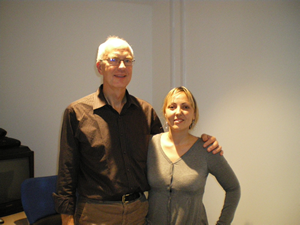Profesor
Professor dr. J.H.T.H. Erik Andriessen (Delft University of Technology) will give an intensive course on virtual teams at the University of Valencia. (11-18 October 2008).




All the seminars have been supported by a grant from Banco Santander Central Hispanol BSCH

Personal information from the page of Professor dr. J. H. T. H. Erik Andriessen
He studied industrial psychology during the sixties, received his Ph.D. in 1974 at the Free University in Amsterdam. Main research areas: decision making in organisations, industrial democracy, meaning of work.
From 1980 to 1990 he was head of the Department of Organisation and Policy Research at the IVA, a research and consultancy organisation related to Tilburg University. Research in the areas of decision making, personnel psychology, work organisation and automatisation.
Since 1990 he is professor of Work and Organisational Psychology at Delft University of Technology, the Netherlands. He and his group are involved in research with regards to, knowledge management and communities of practice, teamwork,. He has published widely, his latest books are on Knowledge Management and on Mobile Virtual Work.
Central topics of research and consultation
- New forms of work and organisation, recently particularly virtual and mobile work (new publication below)
coordinator of Saltsa-sponsored international research group 'Mobile Virtual Work".
- Knowledge management and communities of practice (recent publication below
coordinator of the Communities Research Group and Community Assessment Toolkit (CAT): http://communities-research-group.tudelft.nl/index.htm
- Distributed teamwork and groupware (publication below)
- Innovation processes and evaluation methodology

Publications
2005 Publication:
Mobile Virtual Work - A new Paradigm?
Edited by: J. H. Erik Andriessen , Delft University of Technology, The Netherlands, and Matti Vartiainen , Helsinki University of Technology, Finland
Heidelberg: Springer.
This is a book about mobile virtual work. The objective is to contribute to the understanding and the improvement of an emerging new kind of work arrangement, i.e. mobile virtual work (MVW). Until now no systematic in-depth studies of this phenomenon have been available.
The book has grown from several workshops that brought together experts from a wide range of areas. Through their cooperation a state of the art overview could be constructed of areas and aspects related to MVW: from ergonomic requirements to diffusion of mobile work systems, from implications for distributed cooperation to knowledge management for mobile employees.
The book is not primarily about technologies and tools, although many mobile systems will play a role in the studies presented. Its special merit is that it contains many concrete case studies. That means that MVW is described and analysed with an eye both on theoreticians and practitioners.
2004 Publication:
How to Manage Experience Sharing. From Organizational Surprises to Organizational Knowledge
Edited by J.H. Erik Andriessen , Delft University of Technology, The Netherlands , and Babette Fahlbruch , Berlin University of Technology , Germany
Oxford, UK: Elsevier.
This book has grown from a workshop that brought together researchers and practitioners from a wide range of areas, including the safety domain. The focus of the workshop was in the well-known issue of organisational learning and organisational memory. The authors come from widely different disciplines, such as safety consultancy, organisational psychology, computer science and law.
The focus of some contributions is on individual and group processes, others on organizational strategy or societal and environmental issues. One of the central issues in the book is the comparison of knowledge management in two settings: learning from failures in accident sensitive environments and learning from success in service organisations.
Some key questions addressed in this book are: How can an organisation learn from its successes and failures, from its experiences and accidents? How can we prevent the loss of knowledge caused by intensive employee turnover or retirement? How can implicit knowledge be shared with colleagues and newcomers? To what extent can Information and Communication Technology (ICT) help to solve these problems?
2003 Publication:
Working with Groupware. Understanding and Evaluating Collaboration Technology.
Andriessen, J.H.Erik .
London: Springer Verlag
In this book the focus is on the social aspects of how virtual and geographically dispersed groups work together using information and communication tools (groupware). It introduces the basic concepts and brings together ideas from various disciplines to provide an integrated approach to the evaluation and design of groupware technology.
In this book I approach the field as a work and organisational psychologist, analysing theories and concepts that may explain organisational, social and psychological conditions for success and failure of these tools.
Key topics include:
- Why some collaboration technologies succeed and others fail.
- The conditions needed for successful distributed collaboration
- How to take a systematic, user-oriented, design-related approach to the evaluation of computer supported collaboration
Since the book integrates concepts and insights from various disciplines it is of interest for readers of various background. It is intended for undergraduate and postgraduate students, on the one hand those studying technical sciences such as Information and Communication Technology, Computer Supported, Co-operative Work, Human-Computer Interaction or Human Factors, on the other those studying social sciences such as Social and Organisational Psychology, Sociology and Communication Sciences.

Selection of other publications:
- Andriessen, J.H.T.H.(1991) Mediated communication and new organisational forms . In C.L.Cooper & I.T.Robinson, International Review of Industrial and Organisational Psychology. Wiley.
- Andriessen, J.H.T.H. & J.M. van der Velden (1993) Teamwork supported by Interaction Technology: The beginning of an integrated theory. In: European Work and Organizational Psychologist, 3, 2. p. 129-145
- Andriessen, J.H.Erik. & Robert A. Roe (Eds.) (1994) Telematics and Work . Hove, Sussex: Lawrence Erlbaum.
- Andriessen, J.H.T.H. (1994) Conditions for successful adoption and implementation of telematics in user organizations. In J.H. Erik Andriessen and Robert A. Roe (Eds.), Telematics and Work . Hove, Sussex: Lawrence Erlbaum.
- Andriessen, J.H.T.H. (1995) Why, how and what to evaluate of interaction technology. In: MacLeod, Miles & Thomas, P., CSCW Requirements and Evaluation . Springer-Verlag CSCW Series.
- Andriessen, J.H.Erik & Drenth, Pieter J.D (1997) Leadership: Theory and models. In: Drenth, Pieter.J.D., Thierry, Henk, De Wolff, Charles W.. Handbook of Organizational Psychology Hove, UK: Psychology Press.
- Andriessen, J.H.Erik, R. Koorn, A.G. Arnold, A. Anderson A. Fleming, J.J. McLeod, J. (1998). The MEGATAQ Handbook: Methods and Tools for User-Centred Evaluation of Telematics Applications . EU-TA-Project TE2007. Delft: University of Technology.
- Andriessen.J. H.Erik , Maura Soekijad & Helen van der Horst (2002). Organisational and technical support for knowledge sharing in communities . Delft, The Netherlands: DUP Science.
Delft University of Technology
Faculty of Technology, Policy and Management
Psychology of Work and Organization
Jaffalaan 5
2628 BX DELFT
The Netherlands
Tel.: +31 15 278 1742
Fax: +31 15 278 2950
e-mail: erika@tbm.tudelft.nl
